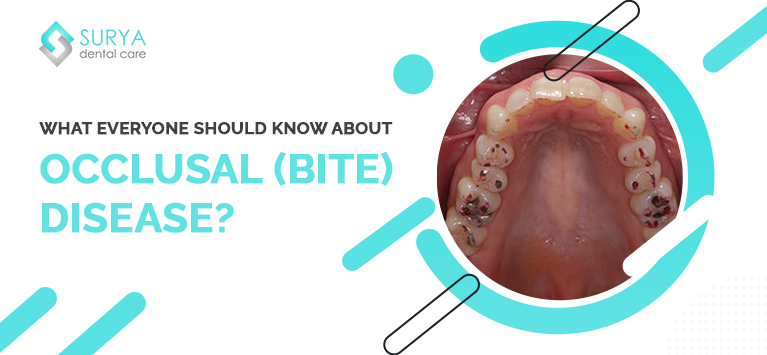
Occlusion is the term that defines how the upper and lower teeth fit together. Occlusal (Bite) Disease will happen if there is an anomaly in the contact between the biting surfaces of upper and lower teeth. It is a generic term that refers to numerous pathological conditions affecting your bites. It is the most undiagnosed oral disease because even the sufferers do not sense whether they have occlusal disease.
Even though it is a destructive process that misaligned teeth undergo, it does not affect the teeth functioning in its early stage. Hence many people often ignore its subtle signs. Remember that the ailment will progress so that more devastating effects will occur if this condition is not treated promptly.
In this blog article, our dentists have shared various irregularities that denote occlusal disease and the available therapeutic solutions.
What causes Occlusal Disease?
When we bite normally, the biting force is distributed equally among the teeth, jaw joints, and muscles. In contrast, if the bite is unbalanced, the force cannot be exerted equally on these counterparts. When this occurs frequently, the teeth do not function properly. Damage to other dental structures is also unavoidable. It is the primary cause of occlusal disease.
In simply, the activities that exert uneven strain on the teeth are linked to this condition. Here are a few examples:
- Having crooked or crowded teeth
- Teeth grinding
- Teeth clenching
- Chewing inedible things
- Biting hard substances
- Habits like nail biting
Besides these, toothpaste abrasion, enamel erosion, and dental attrition also increase the risk of occlusal disease.
What are the signs & symptoms that manifest occlusal disease?
As the teeth undergo constant wear and tear, you would notice abnormalities like
- Enamel wear down
- Cracks in teeth
- Fractured restorations
- Deep grooves near the gum line
- Gum recessions
- Teeth sensitivity
- Teeth mobility
It is hard to pinpoint the occlusal problems with these symptoms because various dental dilemmas share the discussed symptoms. As discussed earlier, occlusal disease disrupts the surrounding dental structures due to which the sufferer would encounter the following difficulties as well:
- Muscle pain in the face
- Tiredness in facial muscles
- Chronic headaches
- Pain and tightness in jaw muscles
- When opening and closing the mouth, there is a popping sound.
- Ringing in the ears
How is the occlusal disease treated?
An accurate diagnosis of OD is pivotal to detect this ailment. Hence dental doctors perform a comprehensive assessment of teeth, jaw joints, gums, and head and neck muscles to check if there are any signs of OD. Likewise, bite evaluation and X-rays are also taken for diagnosis.
Once the root problem is identified, a tailored treatment plan is created. Here are the most commonly prescribed occlusal disease treatments:
- Bite Balancing – The process of making minor changes to the biting surfaces of teeth in order to achieve an even bite.
- Dental Braces – If crossbite, overbite, or underbite is the root cause of OD, then the patient should straighten the teeth with orthodontic appliances like metal braces, Invisalign, and retainers.
- Nightguards – The victim should wear a nightguard to protect themselves from the destructive effects of the occlusal disease if it occurs due to sleep bruxism.
- Dental restorations – When a patient has fractured teeth or cracks in the teeth surfaces due to the bite problem, the damaged areas should be restored with fillings, crowns, or other appliances to conserve the remaining portions.
Bottom line
Occlusal disease typically happens due to untreated bite problems. This is the most undiagnosed dental dilemma and is quite hard to treat. If you detect any unusual changes in your tooth structures, as well as problems with your neck or ears, you may have occlusal disease. In most situations, it cannot be diagnosed without a dentist’s help.
Remember that the longer you delay occlusal disease treatments, the faster it will advance and cause harm to your oral cavity.



